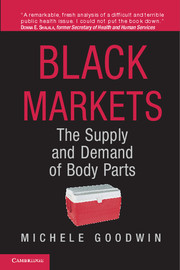Preface
Published online by Cambridge University Press: 14 September 2019
Summary
Organ poachers and distributors have developed international networks and some are more sophisticated than others. In October of 2005, police in Pakistan arrested a group of organ robbers from Afghanistan shortly after the devastating earthquake that killed more than 57,000 people and left more than half a million people homeless in that region. The four men were caught carrying a cooler that contained 15 organs from victims who did not survive the devastation. The victims’ corpses were left in the rubble, emptied of the precious kidneys.
Americans live with the understanding that thousands will die each year because too few organs are donated in our present procurement system. Our demand for organs is soaring and the supply is very low. How we resolve this conundrum will reflect our values for autonomy, human dignity, and life-saving efforts.
The interrupted journeys of a few individuals who bravely fought (and later lost) their battles against treatable diseases helped to inform this book. Quite a few had been dropped from transplant waitlists or were misinformed about the benefits of transplantation versus dialysis. In particular, the willingness of some of these individuals to pay for organs to save their lives was a profound statement, particularly because they were African American. They presented an interesting juxtaposition to the race-based rationale for a ban on organ selling. For years, commentators based their opposition to markets in organs on the theory that organ selling resembled slavery. They predict that organ markets would hurt African Americans. Some scholars suggest that an open market in organs could result in familial homicides. They also argue that financial incentives could lead to economic irresponsibility (for the sellers). Some argue against financial incentives in organ procurement, opining that all financial transactions with the human body are coercive and could destroy the integrity of African American communities. Such fears have, in my opinion, limited the discourse and inquiry about how to increase organ supply. We may not know the impact on African Americans as participants in a market system, but statistics reveal how they have been disproportionately “hurt” by the current “altruistic” transplantation model.
- Type
- Chapter
- Information
- Black MarketsThe Supply and Demand of Body Parts, pp. xi - xivPublisher: Cambridge University PressPrint publication year: 2006



